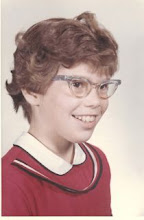Please join me in welcoming today's guest blogger, Paul W. Hankins. Paul teaches English 11 and AP English Language and Composition at Silver Creek High School. He lives in Floyds Knobs, Indiana with his wife, Kristie, their two children, Noah (13) and Maddie (11). Paul is a Wonder Lead with The National Center for Families Learning and an active member of many professional organizations. You can find him at Facebook and Twitter.
.jpeg) |
| Paul and a friend |
Why, This Book. . .
It's an honor to be able to write to you from Kirby Larson's blog today. Wow. Wait a minute. I am writing a blog. And Kirby Larson is sharing said blog. I'm tempted to think that this is as good as it gets.
But I know better. Because I read.
Books.
In a recent conversation with a mentor and friend about wonder and the condition of wonder, I thought about a prompt that might sound like "Why I Wonder. . ." And then I thought about those games we used to play in school where one might put the emphasis upon different words within a sentence thereby changing the meaning of that sentence.
I think this works here. And I would like to explore the idea with you today as we explore the future of books.
WHY, This Book:
It's an exclamation that begins a narrative wherein a reader tells you about that one book they read within that one moment in time. It was the one they held and found that the book held them too. If the reader had the book in his or her hand while speaking these words, you might seem them open the book and place it page-side in against their chest like an armor plate against anything that might come for their heart.
Books do this. Their permanency comes from their invitation to readers to open them as much as their innate ability to open readers to worlds, to ways, to wonder.
And if you were to ask them when they knew--beyond a shadow of a doubt--that they were, in fact, a reader, they would respond, "Why. . .this book. . ."
Why THIS Book:
Now, this is the reader with that book in hand.
It's been taken off of the shelf with a friend in mind.
It's been taken out of a book bag during a lunch date as an impromptu gift between friends. The kind of gift both would expect from the other. It never fails. Whenever they meet, they have a book to share with the other. And always the story of how they found it, what they found within it, and what the book found within them.
We are always losing our cherished books to the hands of the friend who has now found them. Because it is THIS book. This author. This title. THIS book makes us so thankful to the people who came before who taught us to read.
But who taught us to share? THIS book. Somewhere in the margins we readers find ourselves in the fold. We read from left to right and down. But when there are no pages left, if never feels right to just put a book down. So we pass it on.
THIS book.
You're going to love it.
Why This BOOK:
Because it is the one gift that you can give used but arrives in the hands of the reader who has not read the book new.
The future of books is found within our continuing to share them. The book from the shelf into the hands of a friend is to look at ourself by way of the story we are sharing. Readers share books as a means of leaving something of themselves as a reader in that room. We know when our reader-friends see that book upon the counter, upon the ottoman, or upon the bedside table they are seeing us from the other side of the cover.
Hand-to-hand. Reader to reader. The future of books.
The sharing of stories from the circle about the fire to the fingers wrapped around the newest release. We continue to gather in small groups for the sharing of stories. We are still warmed by these exchanges.
Why this book. . .
Because the stories we share become the quiet chuckle at a passing reference. The stories we share become our port within the storm when the book becomes buoy. The stories we share are pages become pact.
Thank you, Paul. My mind is whirring with the possibilities you've stirred up here. As a writer, the notion of "pages become pact" is the guiding tenet of my revision efforts. Love thinking about it from a reader's perspective!
Thank you, Paul. My mind is whirring with the possibilities you've stirred up here. As a writer, the notion of "pages become pact" is the guiding tenet of my revision efforts. Love thinking about it from a reader's perspective!



I LOVE this post!
ReplyDeleteLove this post, Paul! I'm going to share the link with my colleagues!
ReplyDeleteWonderful post!
ReplyDelete